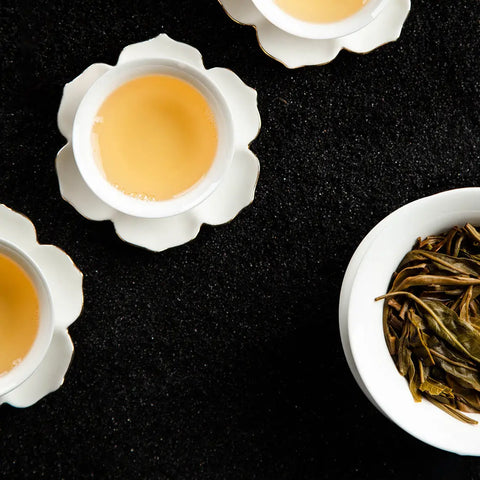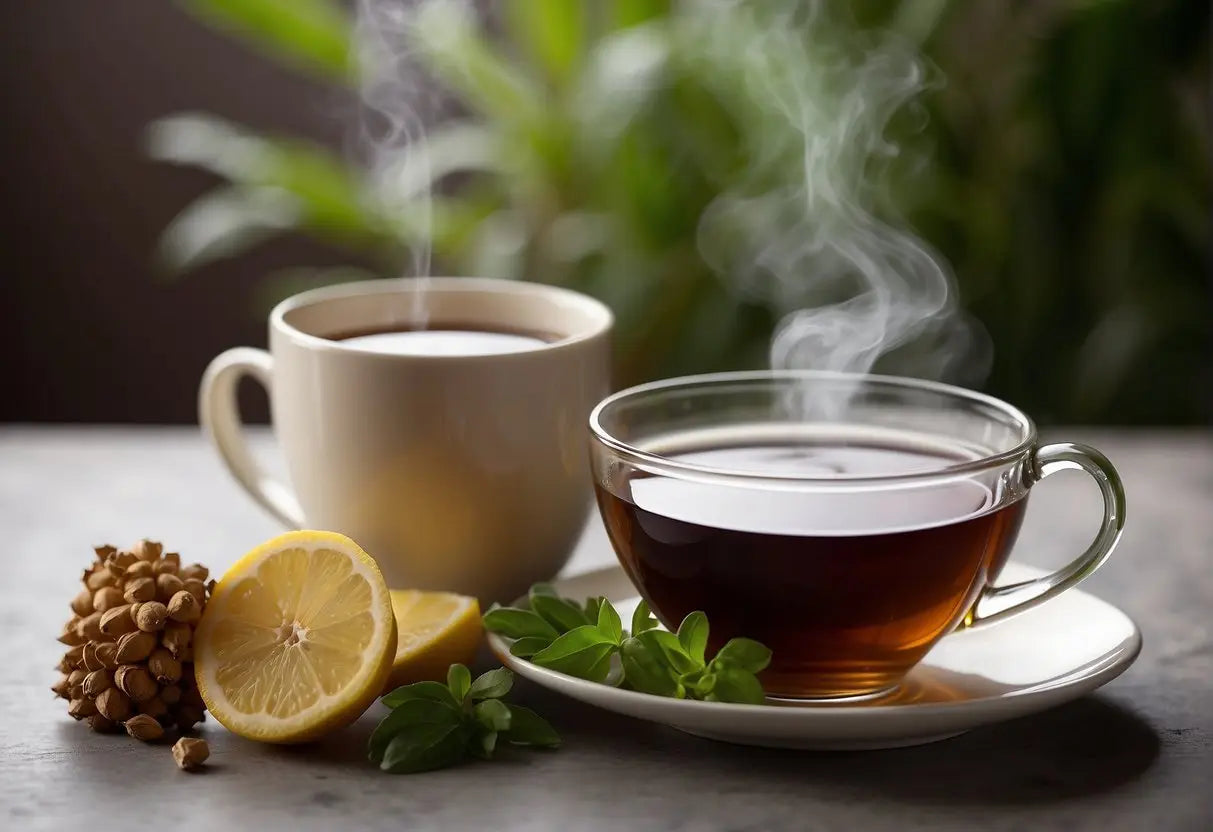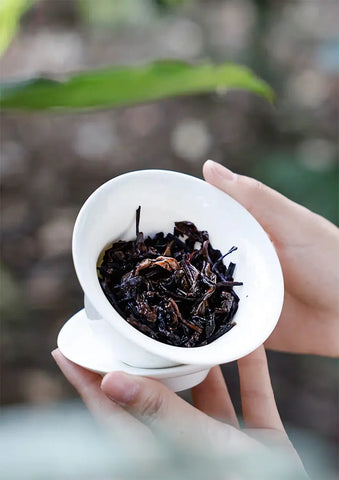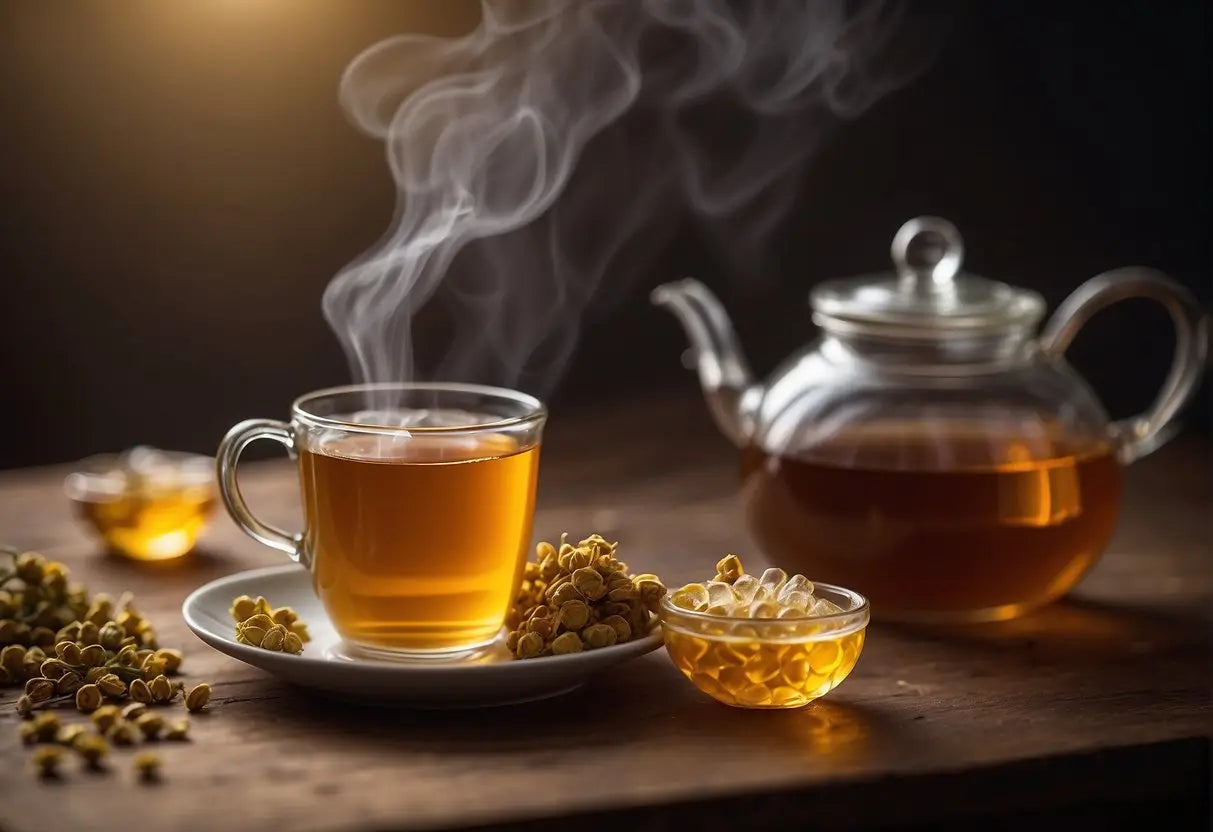What Tea is Good for Cough
When you're dealing with a cough, certain types of tea can provide relief. Herbal teas are particularly helpful, as they are caffeine-free and hydrate your body while soothing your throat.
- Chamomile Tea: This tea has natural anti-inflammatory and antispasmodic properties, helping to relax the muscles of the upper respiratory system and ease coughing.
- Peppermint Tea: Peppermint contains menthol, which acts as a natural decongestant, thinning mucus and breaking up coughs. It also soothes sore throats.
Honey and Lemon: Adding honey and lemon to your tea can enhance its cough-relieving power. Honey is known for its antimicrobial properties and ability to coat the throat, reducing irritation, while lemon adds a dose of vitamin C and can help cut through congestion.
| Ingredient | Benefit |
|---|---|
| Chamomile | Anti-inflammatory, Antispasmodic |
| Peppermint | Decongestant, Sore throat relief |
| Honey | Antimicrobial, Soothes throat |
| Lemon | Vitamin C, Cuts through congestion |
Ginger Tea is another excellent choice since ginger is known to boost the immune system and has anti-inflammatory effects. For a potent cough remedy, steep fresh ginger in hot water.
Bestsellers
Remember to stay hydrated and consult with a healthcare professional if your cough persists or is severe. These teas can complement your treatment and provide symptomatic relief.
Types of Tea for Cough
Selecting the right type of tea can be beneficial for alleviating cough symptoms. Here are particular teas known for their soothing properties.
Herbal Teas
Herbal teas, especially those containing thyme, peppermint, or echinacea, can help relieve coughs. They possess natural anti-inflammatory and antispastic properties which aid in relieving irritation in the throat.
- Thyme Tea: Helps reduce cough associated with upper respiratory infections.
- Peppermint Tea: Menthol in peppermint soothes the throat and acts as a decongestant.
Green Tea
Green tea is loaded with antioxidants and anti-inflammatory agents. Its catechins are known to potentially fight infections, thus it may provide relief for coughing.
- Antioxidants: Help strengthen the immune system.
- Anti-inflammatory: Reduces inflammation that may cause coughing.
Black Tea
Black tea contains theophylline, which can help in relaxing the airways and relieving coughs. It's best to drink it plain, as milk can sometimes increase mucus production.
- Theophylline: Acts as a bronchodilator, easing coughs.
- Plain Black Tea: Advised over adding milk for those with productive coughs.
Ginger Tea
Ginger tea is widely used for its anti-inflammatory effects, and it helps with coughs by clearing the nasal passages and soothing the throat.
- Gingerol: A compound with powerful medicinal properties.
- Soothing effect: Aids in reducing cough reflex and clearing congestion.
Licorice Tea
Licorice root can soothe the throat and reduce coughing. It acts as an expectorant, helping to loosen and expel respiratory mucus.
- Glycyrrhizin: The active compound that has both expectorant and bronchodilator properties.
- Demulcent effect: Coats and soothes the throat.
How to Choose Tea for Cough

When selecting tea to soothe a cough, consider both the type of cough and the tea's properties. For dry coughs, seek teas that provide a soothing effect, while for productive coughs, look for teas that may help expel mucus.
-
Herbal Teas: Opt for herbal teas like peppermint, chamomile, or licorice root, known for their soothing qualities. Herbal teas are generally caffeine-free and can be consumed at any time.
Tea Type Specific Benefit Peppermint Relieves throat irritation Chamomile Soothing; promotes relaxation Licorice Root Eases cough and sore throat -
Ginger Tea: Incorporate fresh ginger or ginger tea to benefit from its anti-inflammatory properties, which may help in reducing cough reflex.
-
Honey Additive: Adding a spoonful of honey to any tea can coat the throat, offering an additional layer of relief for both types of cough.
Lao Ban Zhang
Be mindful of the temperature; drinking tea that is too hot might aggravate the throat. Aim for a warm tea that is comfortable to swallow. If allergies are a concern, ensure that you're not choosing teas with ingredients that could trigger an allergic reaction.
Brewing Techniques for Effective Relief

When preparing tea to soothe a cough, the steeping time and temperature play crucial roles. Here's a straightforward guide to ensure your brew can help alleviate cough symptoms:
- Choose the Right Tea: Opt for herbal teas like thyme, peppermint, or chamomile, which are known for their soothing properties.
- Water Temperature: Use hot water (but not boiling) to preserve the delicate compounds of the herbs, typically around 208°F (98°C).
- Steeping Time: Allow the tea to steep for about 5–10 minutes. This ensures maximum extraction of the soothing agents from the herbs.
- Cover While Brewing: Always cover your tea while it's steeping. This helps to trap the essential oils of the herbs which are beneficial for a cough.
- Additions for Soothing: Consider adding a teaspoon of honey or a squeeze of lemon to your tea. Honey coats and soothes the throat, while lemon can help break up mucus.
Note: If choosing a tea with caffeine, like green or black tea, be aware that caffeine can sometimes dehydrate, so monitor how it affects your cough.
| Step | Description |
|---|---|
| 1. Select | Opt for herbal teas known for their soothing properties. |
| 2. Heat | Heat water to the right temperature (just below boiling). |
| 3. Steep | Steep the tea for 5–10 minutes, depending on the type. |
| 4. Cover | Keep your tea covered while steeping to trap essential oils. |
| 5. Add | Mix in honey or lemon as per taste and added benefits. |
By carefully following these brewing techniques, your tea can be an effective natural remedy to help provide relief from coughing.
Additional Ingredients to Enhance Tea's Efficacy
When you're dealing with a cough, enhancing your tea with certain ingredients can provide added relief. Honey, for instance, is not only a natural sweetener but also has antibacterial properties which can soothe a sore throat.
Incorporating lemon juice adds a dose of vitamin C and helps cut through congestion, making it easier for you to breathe. Be mindful not to add lemon to extremely hot tea as high temperatures can destroy vitamin C.
Ginger is another excellent addition to your tea; it's known for its anti-inflammatory effects and can help in reducing cough reflexes. A few slices of fresh ginger or a teaspoon of ginger powder can be steeped with your tea.
| Ingredient | Benefit |
|---|---|
| Honey | Soothes throat, antibacterial |
| Lemon | Vitamin C, decongestant |
| Ginger | Anti-inflammatory, reduces cough |
Mint or peppermint leaves are beneficial as well. They contain menthol which helps to relax the muscles in your throat and act as a natural decongestant, easing your cough symptoms.
Lastly, you might want to try turmeric. It contains curcumin, a compound with strong anti-inflammatory properties, and has been used in traditional medicine for coughs and colds. Add a pinch of turmeric powder to your tea for an extra health boost.
Remember to steep these ingredients properly to extract their full flavor and potential health benefits. A combination of these can make your cup of tea a more effective remedy for alleviating your cough.
Safety and Precautions When Using Tea for Cough

When you choose tea as a remedy for cough, it's crucial to consider safety and precautions to ensure your well-being.
- Allergies: Be aware of potential allergies to specific herbs. If you experience symptoms like hives, swelling, or difficulty breathing after consuming a tea, seek medical attention immediately.
- Pregnancy: If you are pregnant, consult your healthcare provider before using herbal teas, as some herbs can affect pregnancy.
- Interactions: Certain teas can interact with medications. For example, St. John's Wort may interfere with the effectiveness of prescription drugs. Always check with a healthcare professional before combining herbal teas with prescription medications.
- Children: Use caution when giving herbal teas to children. Only provide teas that are known to be safe for children and in appropriate dosages.
| Condition | Recommendation |
|---|---|
| Chronic Medical Conditions | Consult with your doctor before using herbal teas if you have chronic health issues. |
| Duration of Use | Limit the use of medicinal teas to short-term use, unless recommended by a healthcare provider. |
- Quality: Purchase teas from reputable sources to avoid contamination with pesticides or heavy metals.
- Overconsumption: Drinking tea in moderation is key; excessive consumption can lead to side effects such as stomach upset or sleep disturbances.
By following these guidelines, you can enjoy the soothing benefits of tea for cough relief while minimizing potential risks to your health.
Understanding Different Types of Coughs
When addressing coughs, you should be aware that not all coughs are identical; they can be categorized based on their duration and the nature of the cough:
-
Acute Cough: This type lasts for less than three weeks. It's often caused by common colds or respiratory infections.
-
Subacute Cough: Persisting from three to eight weeks, this cough usually follows an acute cough and may linger after other symptoms have cleared.
-
Chronic Cough: A cough that lasts for more than eight weeks is considered chronic, and you may want to seek medical advice, as it might be symptomatic of a more serious condition.
Besides duration, coughs can also be described by their characteristics:
| Symptom | Indicates |
|---|---|
| Dry Cough (Non-productive) | No phlegm or mucus is produced, often feels ticklish and is common in viral infections or allergies. |
| Wet Cough (Productive) | Mucus or phlegm is expectorated, typically seen in bacterial infections or sinusitis. |
To better manage your cough, observe the symptoms and consider the following:
-
With phlegm: If you're coughing up mucus, consider expectorants to thin the mucus and make it easier to cough up.
-
Without phlegm: For a dry cough, you might find relief with cough suppressants that reduce the cough reflex.
Remember, identifying the type and nature of your cough is the first step to finding a suitable tea remedy that can provide relief.
When to Seek Professional Medical Advice
If you're using tea to alleviate your cough, it's important to recognize situations where it is appropriate to consult a healthcare professional.
- Persistent Cough: If your cough lasts more than two weeks, it's time to see a doctor.
- High Fever: A fever over 101°F (38°C) can indicate a more serious infection.
| Symptom | Action Required |
|---|---|
| Difficulty breathing | Immediate medical attention |
| Chest Pain | Immediate medical attention |
| Coughing up blood | Immediate medical attention |
- Changing Symptoms: Consult a doctor if symptoms change or worsen suddenly.
Make sure to mention if you:
- Are taking prescribed medications.
- Have pre-existing health conditions.
- Are pregnant or breastfeeding.
Remember, tea can be a soothing home remedy for a mild cough, but it does not replace professional medical advice, diagnosis, or treatment. If your symptoms persist or you have any of the severe symptoms listed in the table, seek professional medical care.
Frequently Asked Questions

In this section, you'll find targeted information on various types of teas and their benefits for cough relief, as well as some non-tea alternatives.
What types of tea are most effective in soothing a dry cough?
Thyme tea and licorice root tea are known for their soothing properties, which can help calm the irritation of a dry cough. These teas contain compounds that help relax the throat muscles and reduce cough reflex.
Which herbal tea helps in reducing mucus during a cough?
Peppermint tea is beneficial for reducing mucus build-up during a cough due to its menthol content, which acts as a natural decongestant and expectorant, helping to break down mucus.
Can green tea alleviate symptoms of a cough and sore throat?
Green tea contains anti-inflammatory properties and antioxidants that can help ease a sore throat and reduce cough severity. Drinking warm green tea may soothe the throat and alleviate discomfort.
What are the best teas to drink for a cough accompanied by a stuffy nose?
Eucalyptus tea and ginger tea can help relieve a cough along with a stuffy nose. Eucalyptus opens up the nasal passages, while ginger reduces inflammation, helping to alleviate congestion.
How does chamomile tea benefit someone with a cough?
Chamomile tea may be advantageous for a cough as it has anti-inflammatory, antioxidant, and astringent properties. Sipping on warm chamomile tea can contribute to relieving throat irritation and reducing coughing.
What non-tea beverages can help in curing a cough quickly?
Warm water with honey and lemon can provide quick relief for a cough. Honey has antibacterial properties and a soothing effect, while lemon cuts through congestion due to its acidity and vitamin C content.
← Older post Newer post →











